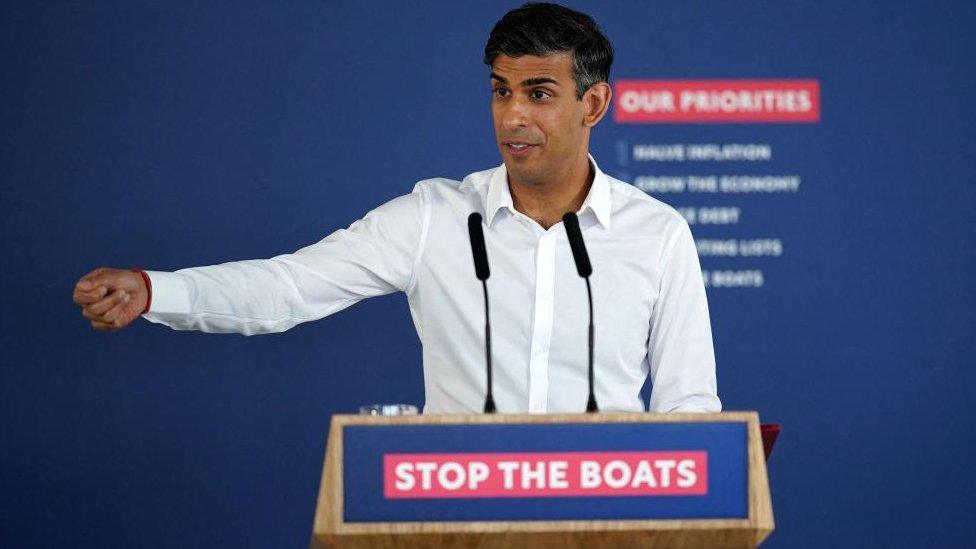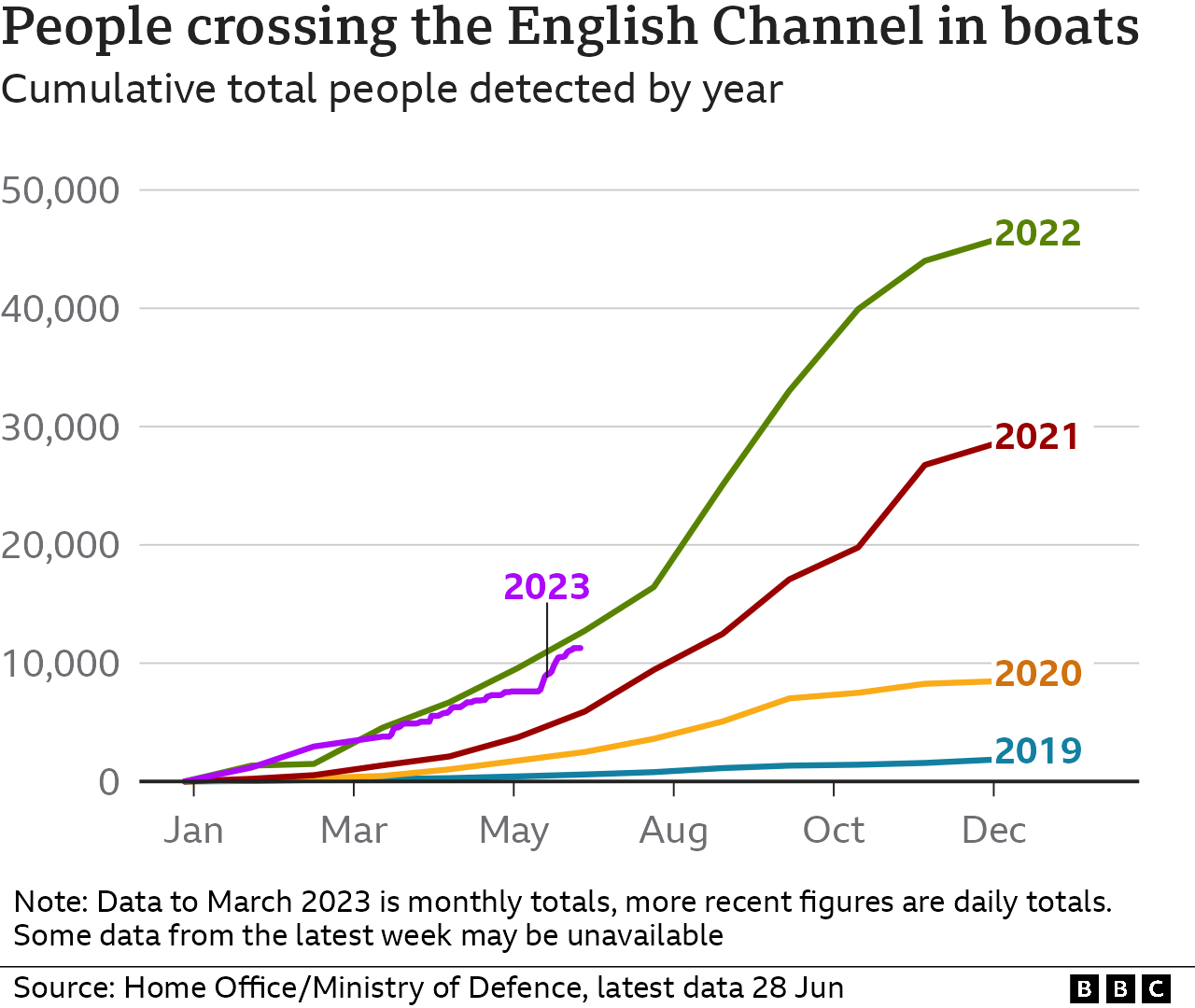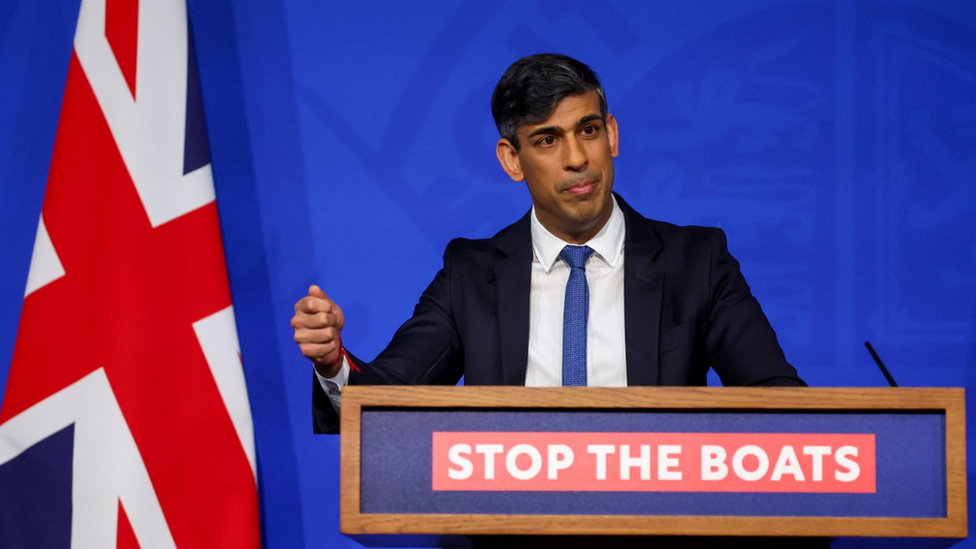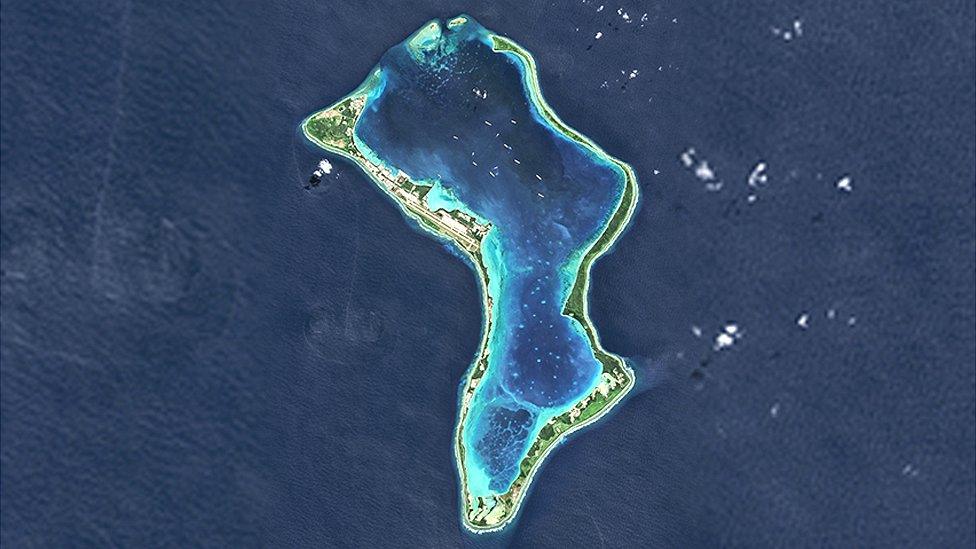Rwanda policy: Government committed to deportation plan - Braverman
- Published
Watch: Braverman "disappointed" with Rwanda ruling
The government is committed to ending cross-Channel migrant boats despite a court ruling its Rwanda policy is unlawful, the home secretary has said.
Suella Braverman told MPs she would do "whatever it takes to stop the boats."
Her comments came after judges at the Court of Appeal ruled that the plan to send asylum seekers to the African country could also breach human rights. The government says it will appeal.
Labour says the plan is "unethical" and Ms Braverman is "ramping up rhetoric".
Asylum Aid, the charity which brought the legal challenge, said the decision taken by the court on Thursday was a "vindication of the importance of the rule of law and basic fairness".
The plan to send people who arrive in the UK illegally to Rwanda was first unveiled in April 2022 in an attempt to deter crossings on the English Channel on small boats.
It has been subject to several legal challenges, including the latest at the Court of Appeal where judges ruled that Rwanda had not provided enough safeguards to prove it is a "safe third country".
Two out of the three judges found that there was a risk that asylum seekers sent to Rwanda could then be forced back to the country from where they were originally fleeing. This means the UK government's immigration policy contravenes the European Convention on Human Rights, which protects against torture.
However Ms Braverman said this did not mean that Rwanda itself was not safe.
The home secretary told MPs she respected the judgement, but added it was "disappointing" and that the government would be challenging it.
Ms Braverman said that the "abuse" of the asylum system was "unfair" on local communities, taxpayers and "those who play by the rules".
She added that it "incentivises mass flows of economic migration into Europe, lining the pockets of people smugglers and turning our seas into graveyards, all in the name of a phoney humanitarianism".
Shadow home secretary Yvette Cooper said the government's Rwanda scheme was "completely unravelling" and described it as "unworkable, unethical and extortionately expensive."
"This is their chaos, their Tory chaos, their boats chaos and their broken asylum system," she said.
She also accused the home secretary of "wasting everybody's time" on "ramping up the rhetoric rather than coming up with a serious plan".
The Rwandan government insisted it was "one of the safest countries in the world" and had been recognised for its "exemplary treatment of refugees".
The case was brought by Asylum Aid, which argued the policy was unlawful, as well as 10 people from countries including Syria, Iraq and Albania, who arrived in the UK in small boats.
The High Court had backed the government's policy at an earlier hearing, but that decision was scrutinised by Appeal Court judges Lord Chief Justice Lord Burnett, Sir Geoffrey Vos and Lord Justice Underhill in this latest stage of the process.
While Lord Burnett sided with the UK government, the others concluded that the assurances from the Rwandan government were not "sufficient to ensure that there is no real risk that asylum seekers relocated under the Rwanda policy will be wrongly returned to countries where they face persecution or other inhumane treatment".
They said that sending asylum seekers to Rwanda will be unlawful "unless and until the deficiencies in [its government's] asylum processes are corrected".
The judges stressed that they all agreed that the Rwandan government's assurances of the policy had been made "in good faith".
Tessa Gregory, a partner at law firm Leigh Day which represented Asylum Aid in the case, said: "We are delighted that the Court of Appeal has ruled that the Rwanda removals process is unlawful on grounds of safety."
It acknowledged that not all of the charity's challenges had been accepted by the court, but said the ruling had affirmed there are "clear deficiencies" with the policy.
Other human rights groups have welcomed the court's decision, with Freedom From Torture describing it as a "victory for reason and compassion".

The PM has made "stopping the boats" a key government priority
The Rwanda policy has hit several roadblocks since it was first announced last April.
The first deportation flight was halted minutes before it was due to take off after a legal challenge was granted in June 2022.
In December, the High Court decided that the plan did not breach the UN's Refugee Convention - which sets out the human rights of anyone seeking asylum - and ruled that it was legal.
But the following month it was decided that some of the parties in that case should be allowed to appeal against elements of that decision - and have the case heard by the Court of Appeal.
This week the Home Office said it expects it to cost £169,000 for every person deported and processed under the Rwanda scheme - more than it currently costs to house an asylum seeker in the UK.
But the same analysis warned rising accommodation costs could mean the cost of housing an asylum claimant in the UK could be £165,000 per person within four years.
The Home Office says it currently spends almost £7m a day on hotel accommodation to house asylum seekers.
Prime Minister Rishi Sunak has said he respects the court's decision but he will do "whatever is necessary" to disrupt criminal gangs operating small boat crossings.
Asked after the ruling if the government was confident the first deportation flight would take off before the next general election, a Downing Street spokesman said it could not "put a timetable on that".


Sign up for our morning newsletter and get BBC News in your inbox.

Related topics
- Published14 April 2022

- Published13 June 2024

- Published11 June 2023
